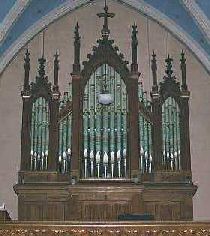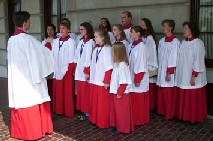Why Catholics Will Want
to Sing Again
by Thomas A. Szyszkiewicz
This article first appeared in the September 26, 2004 edition of National Catholic Register.
 Fresh out of graduate school and newly appointed as music director at the Cathedral of Saint Joseph the Workman in La Crosse, Wisconsin, Lawrence Lawyer was in Rome for a conference on music.
Attending Sunday Mass at Saint Peter's Basilica, he noticed something different about the Lord's Prayer.
It was chanted in Latin — and Lawyer didn't know it.
He felt he had been robbed of the Church's rich musical heritage.
Fresh out of graduate school and newly appointed as music director at the Cathedral of Saint Joseph the Workman in La Crosse, Wisconsin, Lawrence Lawyer was in Rome for a conference on music.
Attending Sunday Mass at Saint Peter's Basilica, he noticed something different about the Lord's Prayer.
It was chanted in Latin — and Lawyer didn't know it.
He felt he had been robbed of the Church's rich musical heritage.
"Because of some people's interpretation of the documents, chant was taken away from me," he said.
Now the music director at Saints Peter and Paul Parish in Mankato, Minnesota, he's working to restore that.
"Most people dumb down the faith, make it wimpy, and they want to be entertained."
Lawyer is not alone in his concern about the musical situation in the Church.
Richard Proulx, one of the foremost composers and choir directors in the United States, believes that one day we could end up with what he termed the "liturgical DJ."
Right now, Proulx said, there are no up-and-coming composers or organists in Catholic colleges.
Northwestern University and the Eastman School of Music have closed what were once prestigious organ programs and the choir program at The Catholic University of America is underfunded, he said.
None of the colleges that many people see as being particularly close to the magisterium — Thomas Aquinas, Franciscan, Christendom and others — offer a major in music.
Proulx points out that the publication of the new Roman Missal in English within the next two to five years could lead to the discarding of a lot of the music — good and bad — that has been written since the end of the Second Vatican Council.
The revised translation most likely will not metrically fit much of the current music.
Of course, many would like to see a lot of the current music thrown out.
What Proulx calls "informal music" dominates the Catholic parish scene today.
This type of music finds its origins in David Haas, Marty Haugen and Father Michael Joncas.
Not only, in Proulx's view, is the music lacking, but the lyrics have been called into question by many as approaching the heterdox end of things.
There was a time just prior to Vatican II when "the principles of classical music were being used and explored in a modern way," Proulx said, but that "was suddenly cut off" after the council.
There "was another flowering in the 1980s, particularly at the cathedrals," he said, but it was not long-lived.
Since then, in Proulx's view, liturgical music has been allowed "to turn mundane."
Always Hope
But there is always hope.
For instance, there are now three Catholic choir schools in the United States — and two each in Canada and Mexico — which have formed an association, the North American Schola Cantorum Network.
The organizer of that group, Kevin Vogt, is director of music at the Cathedral of Saint Cecilia in Omaha.
He is considered one of the foremost improvisational organists in the country and has composed Mass settings himself, though he will not be doing any more until the new Missal appears, he said.

The choir schools are elementary schools that teach music and choral singing in an intensive way.
The Boston Archdiocesan Choir School is the oldest and most well-known and is home to the the Boston Boy Choir.
And the Madeleine Choir School in Salt Lake City, a coed program in contrast to the all-male Boston school, is beginning to get a lot of attention.
In fact, Proulx and Vogt both say the choristers from this school are comparable to those found in the famous choir schools of England.
But how much influence children from these programs will have in the future life of the Church is another question.
John Dunn, the director of the Boston Boy Choir, said the majority of his singers go on to other areas besides music after graduation.
Where Vogt finds good music even more compelling is in the "very humble places" — smaller, non-cathedral parishes.
As an example, he cited Saint Paul the Apostle in Westwood, California, near UCLA, where Martin Neary worked until recently.
Neary is the former director of the Winchester Cathedral Choir and Westminster Abbey Choir [UK].
And the Church of the Holy Childhood in Saint Paul, Minnesota, also has a long tradition of good choral singing, Vogt said.
Taking It Seriously
One other person who is not without hope is Msgr. James Moroney, director of the Secretariat for Liturgy of the U.S. Conference of Catholic Bishops.
In fact, he said, the bishops' liturgy committee recently resurrected a subcommittee on music chaired by Bishop Allen Vigneron of Oakland, California.
Msgr. Moroney said this is a clear indication that bishops are beginning to take the state of music in the United States seriously.
And to make that point even clearer, two consultations were held recently in Washington DC and Chricago, with some of the top liturgical musicians on putting the new Roman Missal to music.
While the forthcoming translation of the missal is expected to be more faithful to the Latin than the current one, English-speaking bishops from around the world recently reviewed the work in progress, and many felt it had poor style, which can be a hindrance to setting it to music.
Msgr. Moroney acknowledges there are "real problems" on the level of formal training for musicians.
"There is a real shortage of organists across the country," he said.
A lot of that, many musicians sya, has to do with the lack of pay in those positions.
The shortage is there despite the fact that organ building in the Catholic Church is actually a "bright spot" in the organ-building world, according to Charles Hendrickson, owner of Hendrickson Organ Company in Saint Peter, Minnesota, and former president of the Associated Pipe Organ Builders of America.
The lack of pay may actually be a reflection of a misunderstanding of the place of liturgy in the Church.
"We don't have more important things to do than the worship of almighty God," Msgr. Moroney said.
"Do we really believe it — that we are dealing with the source and summit of our faith?"
Thomas A. Szyszkiewicz writes from Altura, Minnesota. | 


